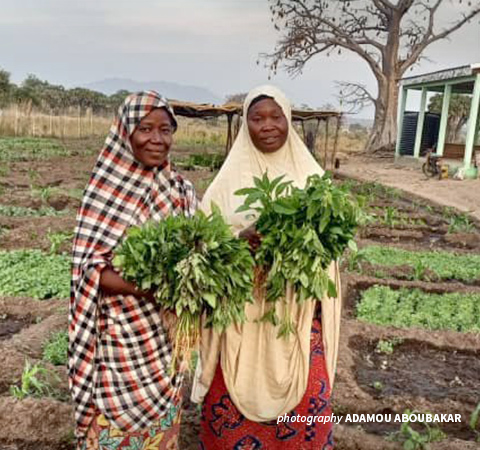Earth Day is every day for this tree-planting community in Cameroon

AWF and the World Agroforestry Center (CIFOR-ICRAF) operate a nursery at the Tchamba Rural Resources Center in Faro, Cameroon
Scorching sun, cracked earth, and dry grass; it is just another afternoon in Tchamba, a small village in the Faro landscape in Northern Cameroon, bordering Nigeria and 216 kilometers from Garoua, the region’s capital city.
At the community’s Rural Resources Center, a kilometer from the main market, a group of women and children are busy fetching water at a public tap and chatting excitedly. While the younger members of the group are moving the water containers to huts back in the village, the older women are watering and weeding the growing shoots in the furrow beds a few steps away.
A little further from them, a group of men, cheered on by Adamou Aboubakar, AWF Community Development Officer working in the Faro landscape, are extracting tree seedlings from a nursery and distributing them to 27 men, women, and students from the area. It is community tree planting day in Tchamba.
Among the recipients is Hapsatou Hadjara, 26, a housewife and mother who depends on the water and materials from the Rural Resources Center for her livelihood. She is always eager to join activities for the community tree planting days, which she believes contributes enormously to regreening her community and the broader landscape.
“Since we started planting trees in this community, it’s like the village can breathe again, and we, too, can breathe along with it. Trees make our surroundings green and fresh and serve as shades, especially when the sun is very hot. Plus, once they have grown, they provide us with food,” she said.

The Tchamba Rural Resources Center helps mitigate food insecurity for the Tchamba community
“Two years ago, I received a mango tree, and my husband and I have just harvested our first mangoes. My children were so happy. This year, I received a Moringa tree, and I am glad because I will use the leaves to cook soup for my family. Before all of this, everything was dead in this community, and we never believed we could restore it. But thanks to our Rural Resources Center, we are coming back to life,” Hapsatou recounted gleefully.
The Tchamba Rural Resources Center was set up in 2021, a fruit of the partnership between AWF and the World Agroforestry Center (CIFOR-ICRAF). Since its inception, close to 8,000 indigenous tree seedlings of Moringa, Anacardium, Mangifera, Guava, Pawpaw, and Citrus have been nursed and distributed to communities.
As internationally recognized organizations working to promote biodiversity conservation and landscape restoration in essential natural ecosystems in Africa, AWF and CIFOR-ICRAF merged their field experience in North Cameroon to engage community actors in a context that is sensitive to their local environment. This people-centered approach empowers communities in wildlife-rich landscapes to promote agroforestry and wildlife protection.
“In this community, for example, locals had ignorantly cut off all their trees for wood and fuel. Today, they know better. That’s why everyone is working hard to nurse the seedlings at the Rural Resource Center, which up to now, remains the only place in the community where people can get clean drinking water, grow fresh vegetables, and even fodder for their cattle, and nurse trees for community planting,” explained Aboubakar.
Creating conservation-friendly income sources
CIFOR-ICRAF has been developing rural resource centers since 2006 to serve as training and demonstration hubs managed by grassroots organizations for the large-scale adoption of innovative agricultural and agroforestry practices. In addition to contributing to the restoration of larger landscapes, AWF uses the center to create opportunities for alternative livelihoods through food provision and income-generating activities to steer local populations away from poaching and livestock herding in Faro National Park.
Habitat degradation, deforestation, biodiversity loss, and food and water insecurity are just some challenges affecting arid and semi-arid landscapes like Tchamba. Situated in the Sudano-Sahelian zone, known for its dry tropical climate caused by fluctuating rainfall and droughts, the Faro landscape is especially vulnerable to climate shocks.
Yet, the area hosts beautiful protected areas and wildlife habitats, such as the Faro National Park, whose conservation is assured thanks to initiatives run by the Tchamba Rural Resources Center. Notably, the center has become a focal point for community interactions, knowledge exchange, and learning amongst local and indigenous populations, administration services, and local farmers and herders.
Aboubakar noted that trees from the nursery are planted all over, regreening the Faro landscape. “Students are creating school gardens and using the knowledge and products they get from the center to grow them. Even younger ones are picking up the passion for tree planting, which reassures me that in a few years from now, Faro will be green again,” he pondered.
“Without knowing it, this small community is investing in the well-being of the whole planet. This is a dream come true, and I sincerely hope that in other small communities around the world, local populations are given the chance to contribute to Mother Earth’s restoration. For me, Earth Day is every day!” said Aboubakar happily.
> In honor of Earth Day 2023, learn how AWF invests in conservation education in Uganda